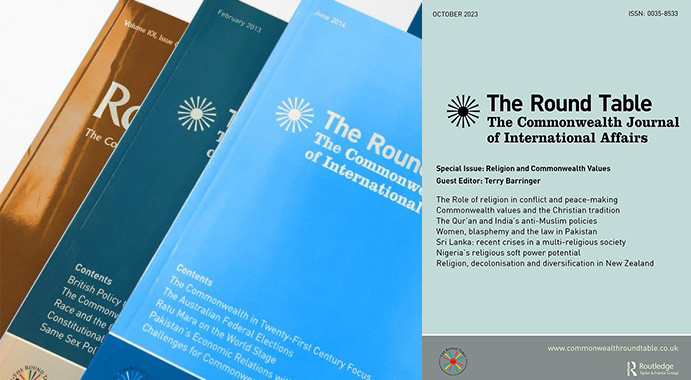
[This article is from The Round Table: The Commonwealth Journal of International Affairs.]
Hugh Segal’s enduring sentiment, ‘To fortify the Commonwealth, we must confront, not avoid, reality’, encapsulates the essence of this distinguished Canadian statesman’s attitude to the Commonwealth. Born into the Jewish immigrant community of Montreal, Segal’s convictions on justice, equity, and fairness were profoundly shaped by his heritage.
His career in Canadian politics is marked by notable stints, including service as Chief of Staff to both Ontario Premier Bill Davis and Prime Minister Brian Mulroney. His Senate appointment in 2005, from which he retired early in 2014, saw him actively participate in vital committees and author publications addressing Canada’s social and economic fabric.
Segal’s balanced and insightful views earned him respect across political aisles and the broader Canadian society. His post-Senate journey led him to impart wisdom as Master of Massey College at the University of Toronto and, later, at Queen’s University.
Segal was a member of the Eminent Persons Group (EPG) from 2010 to 2011, submitting its report, A Commonwealth of the People: Time for Urgent Reform, to the Commonwealth Heads of Government meeting in Perth in October 2011. Subsequently, he served as Canada’s Special Envoy for Commonwealth Renewal.
The latter appointment arose out of the Stephen Harper government’s concern about some governments backpedalling from Commonwealth’s values particularly on democracy, the rule of law and human rights. Harper was especially concerned that many Commonwealth governments were prepared to accept the offer by the Mahinda Rajapaksa Government in Sri Lanka to host the 2013 CHOGM when the government had been found by the UN Commissioner on Human Rights and many other international bodies to be responsible for gross human rights violations.
The Commonwealth as a force for good by Hugh Segal
Writing in the Toronto Globe and Mail before the Sri Lanka CHOGM, Segal said: ‘For the Commonwealth of Nations to bestow the honour on Sri Lanka of hosting CHOGM and presiding over the organization as its chair for two years legitimizes a multitude of sins and is the surest way to weaken the Commonwealth and bring its credibility into serious disrepute’.
Upholding Commonwealth values, as reflected in the Commonwealth Charter – one of the recommendations of the EPG – which came into effect in March 2023, was regarded by Segal as central to the Commonwealth’s purpose. In the EPG’s work, he was a strong advocate of the establishment of a Commissioner for Democracy, the Rule of Law and Human Rights.
When this recommendation was rejected by a significant number of Heads of Government at Perth in 2011, Segal lamented the decision, saying later of the Commonwealth: ‘It is an association of like-minded countries with a common parliamentary heritage, who are trying to defend certain values in a constructive and cooperative way. [If] they’re not going to defend those values, if there’s not going to be any instrumentality around that, why would we have the organisation?’
Segal, like many other members of the EPG, was bitterly disappointed that the recommendation of a Commissioner was rejected. He was also disappointed that other important recommendations received scant attention such as making CHOGMs more of a retreat ‘to ensure maximum time … for frank and full discussion’ on ‘setting a global agenda’ and ‘respond[ing] to recent or upcoming events’ after which a Chairman’s statement could be issued rather than ‘lengthy and impenetrable communiqués’.
He recognised that the Commonwealth had been loosened from its moorings and that, although its almost 100 civil societies remain vibrant, the official Commonwealth had lost its lustre and appeal to the people of the Commonwealth.
He observed that ‘Inertia does not generate engagement and support. It’s on those very issues – which divide up, in a way, that are North/South, for example – that the Commonwealth, because of its bridges and legitimacy, should be attempting to build a new path, to suggest a new way through that might not have occurred otherwise in organisations which are either stultified by the veto or tied up on a kind of left/right ideological premise. The Commonwealth doesn’t have those burdens, and the issue is, what does it do with its opportunity?’.
Hugh Segal’s final question continues to preoccupy Commonwealth supporters who worry about its role and relevance in a troubled world which faces new challenges such as climate change, pandemics, organised crime, irregular migration and terrorism. Segal believed that the Commonwealth’s shared values and institutions can be a foundation for collaborative action in addressing these challenges, but only if it acts.
He viewed Queen Elizabeth II as the adhesive that bonded the Commonwealth, and he was optimistic about King Charles in this essential role. A monarchist from the age of 12, he described meeting The Queen as the proudest moment of his life, adding: ‘How the heck did this happen to the son of a Montreal cab driver?’
Segal was not just an exemplary Canadian figure but an undeniable champion for the Commonwealth’s potential and promise.
Sir Ronald Sanders is the Ambassador of Antigua and Barbuda to the United States, Washington, DC, USA and a member of the Round Table International Advisory Board.



